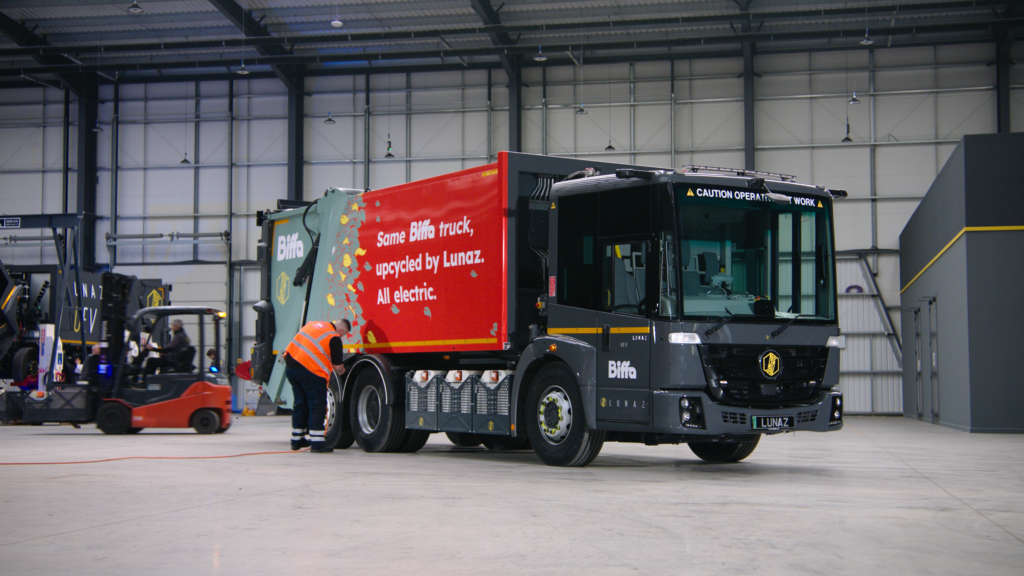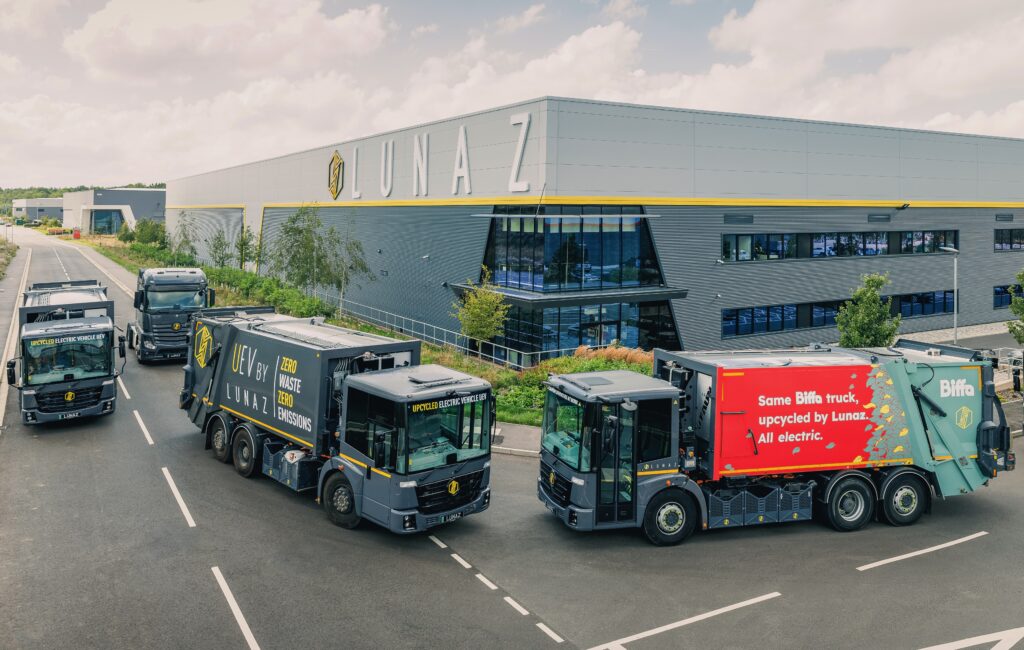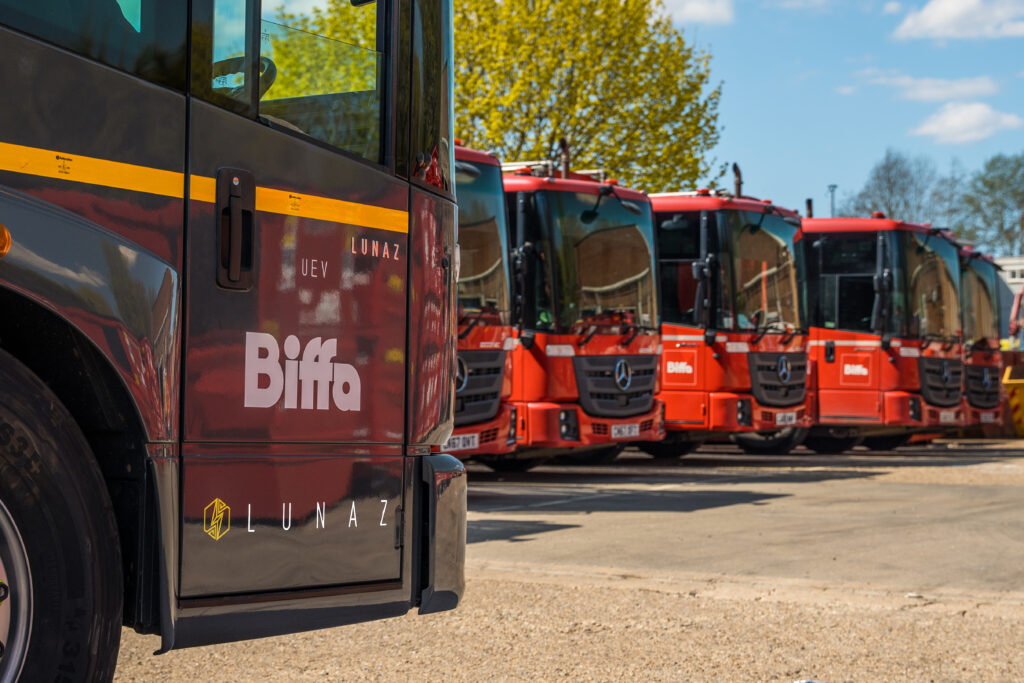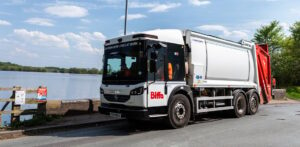Biffa has placed an initial order with Lunaz to convert ten of its diesel RCVs to clean-air electric powertrains, supporting its commitment to reduce emissions by 50% by 2030 – building on a 70% reduction in emissions since 2002 – and to cease buying fossil-fuelled trucks by 2030.
Under a deal signed in April 2023, Biffa has conducted extensive real-world testing with Lunaz’s upcycled electric refuse trucks. With the testing now completed, the two companies will work together over the next decade to support the transition of Biffa diesel refuse trucks to clean-air electric trucks as they reach the end of their useful lives.
The final testing programme was conducted in major urban centres, including Milton Keynes and Manchester, with the trucks operating full domestic and commercial routes alongside their conventional diesel-powered counterparts. As well as evaluating the electric powertrain and battery performance in varying terrain and weather conditions, the programme gathered essential operational feedback from crews and fleet managers.
This latest announcement marks another significant step Biffa has taken towards decarbonising its fleet on its journey towards Net Zero. The Group also recently announced that its near-term scope 1, 2 and 3 emissions targets have been validated by the Science Based Targets initiative (SBTi), demonstrating the company’s commitment to the Paris Agreement goals, which aims to restrict global warming to less than 2°C by 2050.
Biffa’s alternative fuels vehicle strategy is a critical component in its effort to transition its diesel collection fleet to a more sustainable option. In its latest Sustainability Report, published on Thursday, 7 September, the Group announced it has already adopted 120 electric or Hydrotreated Vegetable Oil vehicles in its fleet, representing a step towards reducing emissions and adopting cleaner transportation.
By increasing its collection route efficiency and integrating recent acquisitions, Biffa’s streamlined operations have resulted in significant environmental benefits, saving approximately 1,600 CO2e emissions annually.
Maxine Mayhew, COO of Collection & Specialist Services, said: ‘The streets of Milton Keynes and Manchester provided a challenging real-world test for the Lunaz UEVs, and I’m pleased to say they passed with flying colours. Our drivers and operatives were seriously impressed with how the trucks performed, and the successful trial means we can now move forward with our initial order of 26-tonne upcycled UEVs, saving up to 210 tonnes in embedded carbon.
‘This agreement represents a key milestone for Biffa, highlighting progress towards our sustainability and decarbonisation goals. By working with Lunaz to meet our goal of buying no more fossil-fuelled vehicles by 2030 while breaking the replace-with-new cycle, we are pioneering an approach in this industry.”
This real-world examination followed an earlier formal automotive industry testing programme at Millbrook Proving Ground in Bedfordshire. In a series of trials conducted over several months and more than 50,000 miles, the trucks were subjected to numerous punishing trials, including negotiating ‘Belgium pavé’ cobbled surfaces and gradients of up to 27 per cent and exposure to temperatures ranging from -40 to +50°C.
Historically, the waste management industry has significantly contributed to carbon emissions from road transport: a World Economic Forum report declares that two-thirds of refuse trucks sold in this decade must be zero-emissions to help achieve the UN’s 1.5°C warming target.
Every diesel vehicle upcycled to electric power by LAT saves 82% of the embedded carbon within that vehicle. It also represents a significant total cost of ownership (TCO) saving for the operator compared to both existing diesel vehicles or purchasing new EVs while breaking the environmentally damaging ‘new for old’ cycle.
David Lorenz, Founder of Lunaz, said: ‘This is a landmark moment for Lunaz – the culmination of more than two years’ intensive development comprising simulated and real-world testing for our upcycled electric refuse trucks. Seeing our trucks enter service with Biffa, the UK’s largest operator in the waste management sector, is irrefutable proof of their reliability, capability and durability and a clear demonstration that electric power is both technically and commercially viable in this demanding application. It’s always seemed paradoxical and frankly wrong that diesel refuse trucks should themselves be thrown away at the end of their useful lives. We’re breaking that destructive replace-with-new cycle and making refuse trucks themselves part of the solution. Lunaz is proud to take out the rubbish.’






